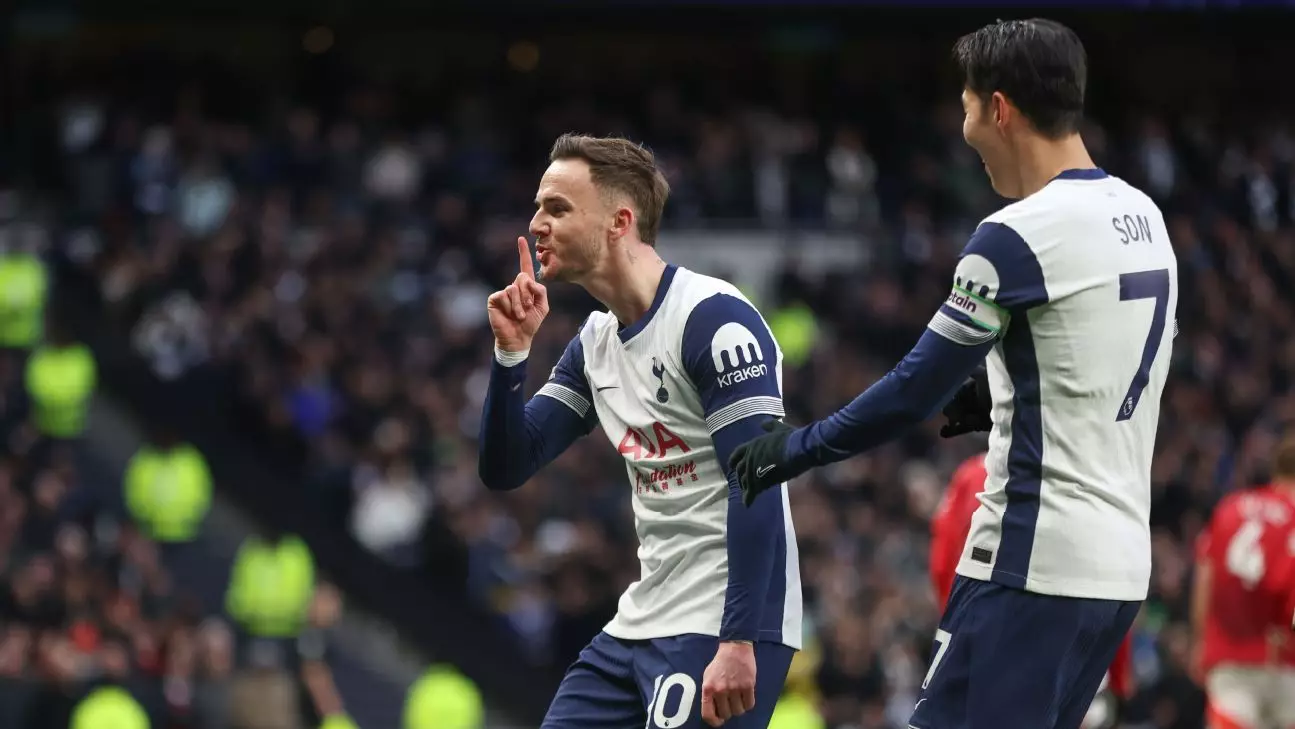In a largely forgettable encounter, James Maddison emerged as the hero for Tottenham Hotspur, scoring the solitary goal that sealed a 1-0 victory over Manchester United. The match, held in North London, lacked the intensity typically associated with such high-profile clashes, yet it provided a significant turning point for both Maddison and Spurs. The midfielder’s 13th-minute strike was not only a testament to his skill but also an opportunity for the 28-year-old to respond to recent criticisms levied against him—particularly by former Manchester United stalwart Roy Keane.
Keane’s remarks on a popular football podcast, where he suggested that Maddison’s dart-playing antics overshadow his footballing abilities, loomed large over the match. The former midfielder dismissed the idea that Maddison could elevate Spurs into the upper echelon of the Premier League, questioning the player’s impact on the team. Keane said, “If you think he’s going to come back and get Spurs top six, you’re in cuckoo land.” These comments could have weighed heavily on a less resilient player, but Maddison utilized them as fuel, channeling his efforts into a decisive performance that would call Keane’s judgment into question.
Maddison’s goal was met with an imaginative celebration that spoke volumes about his mental state. With an imaginary dart in hand, he threw it in the air, followed by a finger-to-lips gesture that echoed his desire to silence critics. “I wanted to do my talking on the pitch today,” he explained to Sky Sports, underscoring the conflict athletes often feel between external noise and self-critique. His words highlight an all-too-familiar struggle in sports: how to balance personal expectations with the incessant scrutiny that comes from social media and pervasive commentary.
He acknowledged the challenges of tuning out external distractions, particularly in the age of social media where criticism and praise are just a click away. However, Maddison expressed a commitment to performance over opinion, emphasizing that while it can be tough to ignore outside noise, focusing on the game is paramount. This approach reflects a mature understanding of high-stakes professional sports, where mental resilience is as important as technical skill.
Tottenham’s ascent in the Premier League table—now sitting at 12th place—can largely be attributed to contributions from key players like Maddison who are returning from injury. Manager Ange Postecoglou praised Maddison’s tenacity and his unwillingness to accept negative feedback passively. “It’s just great to have him back. He is a quality player,” Postecoglou remarked, highlighting not only the player’s physical return but also the character he exhibited in overcoming adversity. This triumph is not solely defined by the goal but also reflects a broader narrative of perseverance and commitment.
Maddison’s effort is a microcosm of the larger team dynamic at Spurs, where injured players are eager to return, demonstrating a hunger to contribute. This collective ethos has been bolstered by a resurgence in team spirit, manifesting in improved performances and results. The coach’s unwavering support for Maddison speaks volumes about the player’s significance in the squad and the trust that management places in him.
Challenges for Rival Teams
Meanwhile, Manchester United finds themselves grappling with their own set of challenges, lying 15th in the league and contending with a long list of injuries. Postecoglou, while acknowledging the difficulties faced by United, cheekily remarked that he wouldn’t be sending sympathy cards to their management. This comment brings a dose of realism to the discussion—injuries are an inevitable aspect of football that all teams must navigate. The pressure of mounting absenteeism is compounded by the consequences it has on team performance, exposing vulnerabilities that rivals can exploit.
While circumstances at United appear dire, the importance of focusing on one’s own squad dynamics cannot be overstated. Maddison’s inspiring performance serves as a reminder that even in times of uncertainty and criticism, resilience and focus can pave the way for success. His return to form will not only energize Spurs but also serve as a lesson in how to respond to external doubts—an aspect of sport that resonates well beyond any single match or season.

